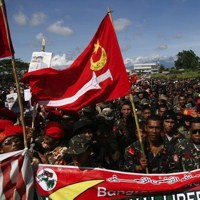With some Southeast Asian Muslims raising funds and recruiting fighters for Syria, concerns are growing that these activities will eventually raise the risk of terrorism in the region. The numbers are still low, but some governments—Malaysia, Indonesia and Singapore in particular—are beginning to wonder what the impact will be a few years hence if some of their extremist nationals or neighbors come back with new skills.
The past decade has seen a steady decline in the extremist threat from the region, which was once seen as a possible “second front” for al-Qaida. Enhanced vigilance, good law enforcement, reasonably cooperative interstate relations, the peaceful resolution of communal conflicts in Indonesia and the closing of major terrorist training centers have combined to weaken the networks that had posed the biggest threat. Jemaah Islamiyah (JI), the group responsible for the 2002 Bali bombings, once had a presence in five countries. But by 2003, it had largely been reduced to Indonesia, and its leaders decided to end violent action there in 2007. They argued that it had become counterproductive, caused unnecessary Muslim deaths, had weakened the organization through arrests and was not supported by the community. JI should therefore focus on religious outreach and education until the organization could be rebuilt, the leaders believed.
Threats from other groups also waned. A JI splinter led by Malaysian national Noordin Top that was responsible for all suicide bombings in Jakarta and Bali from 2003 onward ended with Noordin’s death in police operations following the group’s 2009 attacks on two luxury hotels in Jakarta. The Abu Sayyaf Group in the Philippines, temporarily hampered by the operations of U.S. Special Forces in Basilan, was dispersed and riven by internal factions. The Moro Islamic Liberation Front, which had once worked closely with JI, began to focus its attention on reaching a peace agreement with the government, which meant distancing itself from foreign jihadis. The insurgency in southern Thailand remained an ethno-nationalist struggle and never joined the global jihad, as many had feared.

